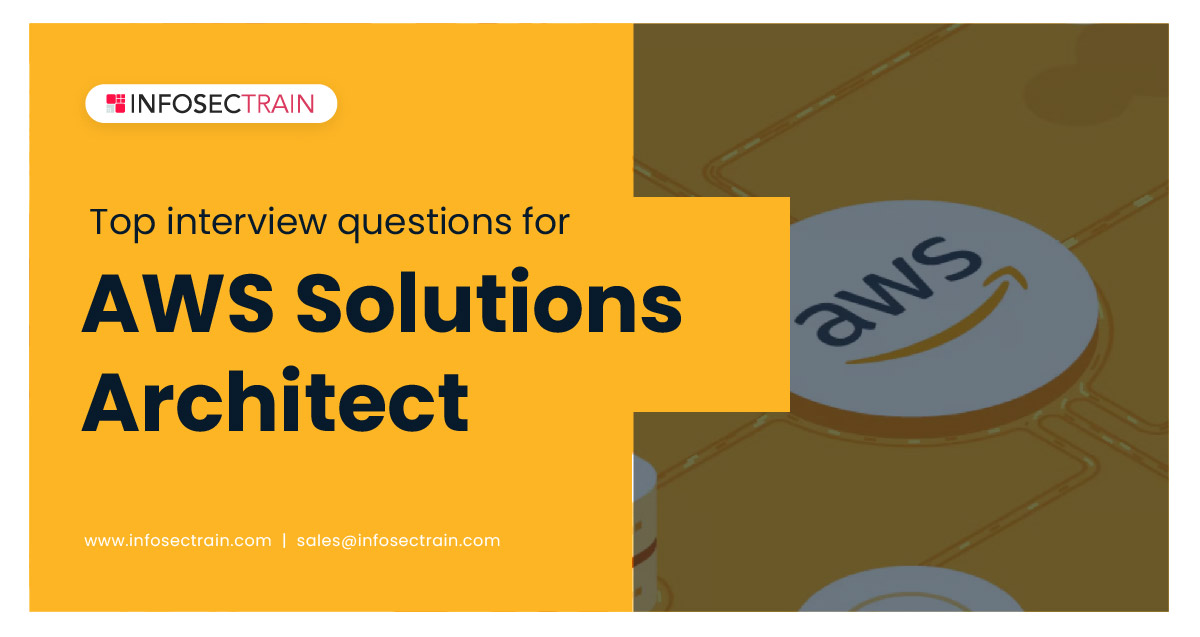Top interview questions for AWS Solutions Architect
Despite significant competition in the cloud computing sector, AWS is the market’s largest cloud service provider. It has now become the driving factor behind business expansion. As a result, an increasing number of businesses are turning to AWS to migrate their operations. As the AWS cloud becomes more widely used, demand for AWS Solution Architects to develop, construct, and deploy complex cloud-based solutions, as well as move existing workloads to the AWS cloud, is increasing.

Increased job opportunities and huge pay packages are some of the many benefits the role offers. So if you are looking to land a job as an AWS Solution Architect, you need to pass the interview phase like any other position, and knowing how to answer the most common interview questions will help you ace the interview. So in this article, we will cover the top AWS Solutions Architect interview questions and answers.
Question 1: What exactly is AMI?
Answer: An AMI or Amazon Machine Image is a kind of template that is used to create a virtual machine on the Amazon EC2 platform. AMI contains all of the information needed to create an instance.
Question 2: What is the difference between elasticity and scalability?
Answer: Elasticity is used to respond to dynamic changes in resource requirements, such as when they increase or decrease. On the other hand, scalability is utilized to accommodate a constant rise in workload.
Question 3: What are the best security practices for Amazon EC2?
Answer: Some of the best security practices for Amazon EC2 are:
- Identity federation, IAM users, and IAM roles should be used to manage access to AWS resources and APIs
- Credential management policies and processes for establishing, distributing, rotating, and revoking AWS access credentials should be established
- Password-based login should be disabled
- The least permissive rules should be used for Security Groups.
- Patch, update, and secure your instance’s operating system regularly
- Patch, update, and secure your instance’s applications regularly
Question 4: Is it possible to connect my on-premises data center to AWS?
Answer: Yes, you can connect your on-premises data center to AWS using various VPN configurations. Also, the AWS Direct Connect lets you connect your AWS environment to your on-premises data center through a conventional 1 gigabit or 10 gigabit Ethernet fiber-optic connection.
Question 5: Can we use Direct Connect to transfer objects from my own data center if we use Amazon CloudFront?
Answer: Yes, custom origins, including those hosted outside of AWS, are supported by Amazon CloudFront.
Question 6: What is Amazon Elastic Compute Cloud?
Answer: In the AWS cloud, Amazon Elastic Compute Cloud (Amazon EC2) provides scalable computing power. It eliminates the need to purchase the hardware upfront, allowing you to create and deploy apps more quickly and efficiently.
Question 7: Is it possible to modify an EC2’s private IP address range of a VPC?
Answer: No, the private IP address will never change whether an Amazon EC2 instance is running or shut down.
Question 8: What is AWS CloudTrail, and how does it work?
Answer: AWS CloudTrail is an AWS service that allows you to manage your AWS account’s governance, compliance, operational, and risk auditing. It registers actions taken by a user, role, or AWS services as events.
Question 9: What happens if CloudTrail is enabled for my account, but my Amazon S3 bucket is not set up with the appropriate policy?
Answer: The log files from CloudTrail are provided in accordance with your S3 bucket policies. CloudTrail will not be able to distribute log files if the bucket policies are incorrectly specified.
Question 10: What is Virtual Private Cloud (VPC)?
Answer: A Virtual Private Cloud (VPC) is a private cloud that is housed within a public cloud and is secure and isolated. Customers using VPCs can execute code, store data, host websites, and do anything else that a private cloud can do, but the private cloud is hosted remotely by a public cloud provider. In AWS, a VPC is a specialized virtual network for your AWS account that is logically separated from the rest of the AWS cloud virtual networks.
Question 11: Does Amazon VPC support the broadcast or multicast properties?
Answer: No, as of now, Amazon VPC does not support broadcast or multicast properties.
Question 12: What is Amazon ElastiCache’s purpose?
Answer: ElastiCache can be used for caching, which improves application and database speed, or as a primary data store for use cases like session stores, gaming leaderboards, streaming, and analytics that don’t require durability.
Question 13: In AWS, distinguish between horizontal and vertical scaling.
Answer: In AWS, horizontal scaling is adding more EC2 machines to your pool of resources, whereas vertical scaling entails adding more processing power like CPU or RAM to an existing EC2 unit.
Question 14: What do you understand about Amazon S3?
Answer: Amazon Simple Storage Service, or Amazon S3, is a cloud storage service that is safe, highly available, and redundant and can be accessed from anywhere at any time. Customers, regardless of size and sector, utilize it for a variety of use cases because of its industry-leading scalability, data availability, security, and performance.
Question 15: How many Elastic IPs are available by default for an AWS Account?
Answer: Five Elastic IPs per AWS account.
Question 16: What is IAM in AWS?
Answer: Identity and Access Management (IAM) is a web service that allows you to manage authentication and access to AWS accounts & services in a secure manner. IAM allows you to manage who is authenticated and allowed to access resources.
Question 17: What do you mean by DynamoDB?
Answer: Amazon DynamoDB is a serverless, fully managed key-value NoSQL database built to run high-performance applications of any size.
Question 18: What is the reason for creating subnets?
Answer: Subnets are created to divide a large network into smaller, interconnected networks in order to segregate and manage traffic.
Question 19: What distinguishes Amazon cloud search from other search engines?
Answer: The following are the features of Amazon cloud search:
- Autocomplete suggestions
- Free text search
- Boolean search
- Faceted search
- Geospatial search
- Highlighting
- Field weighting
- There are 34 languages supported
- Relevance ranking and query-time rank expressions that can be customized
Question 20: Is it possible to use Amazon RDS to run numerous databases for free?
Answer: Yes, you can run up to 40 Amazon RDS DB instances for free.
How can InfosecTrain help?
AWS Solution Architect may be the right profession for you if you’ve just started your career in cloud computing. AWS Certified Solutions Architect–Associate and AWS Certified Solutions Architect–Professional certification training courses are available from InfosecTrain. These courses will teach you how you can develop, implement, and manage safe and robust applications on the AWS platform with the help of our expert trainers. The courses will further prepare you for the AWS Solutions Architect interview.




 1800-843-7890 (India)
1800-843-7890 (India) 
